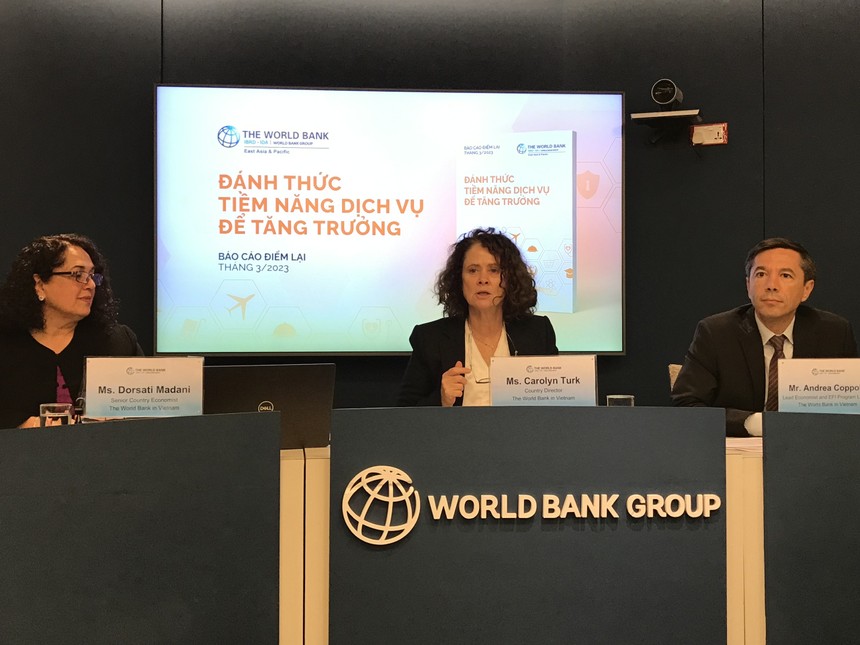Vietnam's GDP growth forecast at 6.3% in 2023: WB
Making effective and necessary investment decisions is critical to shaping the direction of Vietnam's economy for the next 10-20 years.
Vietnam's GDP growth of 6.3% in 2023 is expected to be sustained by steady FDI inflows, a positive economic outlook expected in the second quarter, and increased domestic private investment.
| Overview of the launch. Photo: Hai Yen/ The Hanoi Times |
World Bank’s Senior Economist Dorsati Madani revealed the forecast at the launch of the Taking Stock Report today [March 13], saying the country's growth may accelerate to 6.5% during the 2024-2025 period.
According to Madani, Vietnam’s GDP growth in 2022 remained strong with an increase of 8.0% over the same period, adding such growth could be attributed, in part, to the low starting point from a modest economic expansion rate of 2.6% in the previous year.
He also mentioned that domestic private consumption rebounded from the effects of Covid-19, and export-oriented manufacturing activities achieved stable outcomes during the year.
"However, there are signs of weakening towards the end of the year," said Madani.
The World Bank has reported that Vietnam's current account balance recorded a deficit of $4.9 billion in the first nine months of 2022. As a result, the State Bank of Vietnam (SBV) has taken countermeasures such as foreign exchange intervention, partial devaluation of the local currency, and monetary tightening to reduce pressure on the exchange rate.
Madani also expressed concerns about Vietnam's financial sector, which has faced increased pressure in 2022. In addition, challenges in the budgeting process have affected the originally planned expansion of fiscal policy. “While the short-term outlook is still favorable, but Vietnam is not without risks,” she said.
Due to both domestic and external difficulties, Vietnam’s GDP growth is likely to slow down to 6.3% in 2023. Although tourism is recovering, growth in the service sector is expected to decelerate, largely due to the fading effects of the post-Covid-19 recovery.
Moreover, inflation is expected to rise to an average of 4.5% in 2023, which will erode household purchasing power. This, coupled with rising interest rates, is likely to weigh on private investment, she said.
Madani noted weak external demand will result in a negative contribution of net exports to growth (-0.6 percentage points). However, the approved recovery support program, with a scale of up to approximately 1.6% of GDP, will benefit the economy by accelerating the implementation of the investment component. The current account is predicted to achieve a surplus of 0.1% of GDP over the medium term as commodity exports recover, and foreign visitors, return, and remittances remain resilient.
Taking into consideration long-term view
World Bank Country Director to Vietnam Carolyn Turk believed that the risks associated with such an outlook are relatively balanced.
On the downside, slow growth in Vietnam's main export markets - the US, China, and the Eurozone - could affect exports. Prolonged inflation in the US and the Eurozone may lead to further financial mobilization tightening, affecting Vietnam's financial sector.
Furthermore, there are still geopolitical risks and tensions that may impact investor sentiment in the short and medium term. Continued price increases may raise inflation expectations, putting pressure on nominal wages and production costs, which may destabilize domestic demand.
Weaknesses in the policy framework and supervision of the financial sector and the balance sheets of the corporate, banking, and household sectors may increase risks and affect domestic consumer and investor sentiment. Implementation difficulties may also affect the results of the public investment program.
"On the positive side, higher-than-expected growth prospects in China, the US, or the EU, as well as global demand, may help boost exports, and thus economic growth may improve and exceed the baseline forecast," Turk added.
She emphasized that a favorable fiscal position is crucial to mitigate the risks of a slowdown in economic growth.
In the short term, Turk suggested that the country focuses on implementing capital expenditure plans, particularly on projects identified in the package of policies to support recovery and growth, with a focus on investments in both digital and physical infrastructure. A flexible monetary policy, closely coordinated with fiscal policy objectives, can help control domestic inflation, she added.
Moreover, strengthening the policy framework and supervisory capacity for the financial sector is crucial to address emerging financial risks, Turk added.
Vietnam's economy has shown signs of recovery in the first quarter of the year, with significant inflows of foreign direct investment and a strong commitment by the government to disburse public investment fund. However, to achieve higher growth, the country needs to adopt a new approach to public investment and expenditure management, Turk said.
"Flexibility in capital transfers is critical, and fiscal policy will play a critical role in this regard," Turk said.
"Improving the effectiveness of public investment and budget management tools is essential not only for Vietnam to recover from the impact of Covid, but also to sustain long-term growth," she said.
According to Turk, Vietnam's focus should not only be on recovering from the effects of Covid-19, but also on ensuring long-term growth.
"Making effective and necessary investment decisions is crucial in shaping the direction of the economy for the next 10-20 years," she concluded.













